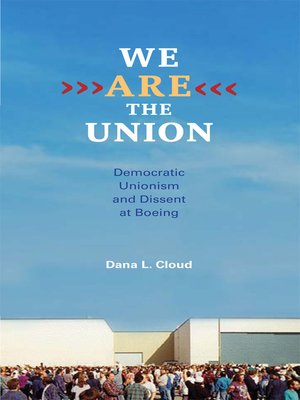
Sign up to save your library
With an OverDrive account, you can save your favorite libraries for at-a-glance information about availability. Find out more about OverDrive accounts.
Find this title in Libby, the library reading app by OverDrive.



Search for a digital library with this title
Title found at these libraries:
| Library Name | Distance |
|---|---|
| Loading... |
In this extraordinary tale of union democracy, Dana L. Cloud engages union reformers at Boeing in Wichita and Seattle to reveal how ordinary workers attempted to take command of their futures by chipping away at the cozy partnership between union leadership and corporate management. Taking readers into the central dilemma of having to fight an institution while simultaneously using it as a bastion of basic self-defense, We Are the Union offers a sophisticated exploration of the structural opportunities and balance of forces at play in modern unions told through a highly relevant case study. Focusing on the 1995 strike at Boeing, Cloud renders a multi-layered account of the battles between company and the union and within the union led by Unionists for Democratic Change and two other dissident groups. She gives voice to the company's claims of the hardships of competitiveness and the entrenched union leaders' calls for concessions in the name of job security, alongside the democratic union reformers' fight for a rank-and-file upsurge against both the company and the union leaders.
We Are the Union is grounded in on-site research and interviews and focuses on the efforts by Unionists for Democratic Change to reform unions from within. Incorporating theory and methods from the fields of organizational communication as well as labor studies, Cloud methodically uncovers and analyzes the goals, strategies, and dilemmas of the dissidents who, while wanting to uphold the ideas and ideals of the union, took up the gauntlet to make it more responsive to workers and less conciliatory toward management, especially in times of economic stress or crisis. Cloud calls for a revival of militant unionism as a response to union leaders' embracing of management and training programs that put workers in the same camp as management, arguing that reform groups should look to the emergence of powerful industrial unions in the United States for guidance on revolutionizing existing institutions and building new ones that truly accommodate workers' needs. Drawing from communication studies, labor history, and oral history and including a chapter co-written with Boeing worker Keith Thomas, We Are the Union contextualizes what happened at Boeing as an exemplar of agency that speaks both to the past and the future. | Cover Title Page Copyright Contents Preface Acknowledgments Introduction: "To Get to Boeing, We First Had to Take on the Union" 1. Business Unionism and Rank-and-File Unionism at the Turn of the Millennium 2. Not a Smooth Flight for Boeing and the Union 3. Enter the Dissidents 4. The Problem with "Jointness" 5. The 1995 Strike and the Rejection of the Second Contract 6. "The Feeble Strength of One" 7. Carrying the Memory of Agitation: A Dialogue between Keith Thomas and Dana Cloud 8. Communication and Clout Conclusion: The Beginnings and Ends of Union Democracy Notes Interviews and Archival Sources Index | "Provides readers with the authentic voices of workers struggling to be heard."—Industrial and Labor Relations Review
"[A] detailed and well-researched study. . . . Makes a case for a more aggressive, more democratic labor movement that could reverse declining union membership density. Recommended."—Choice
|Dana L. Cloud is an associate professor of communication studies at the University of Texas, Austin, and the author of Consolation and Control in American Culture: Rhetorics of Therapy.
We Are the Union is grounded in on-site research and interviews and focuses on the efforts by Unionists for Democratic Change to reform unions from within. Incorporating theory and methods from the fields of organizational communication as well as labor studies, Cloud methodically uncovers and analyzes the goals, strategies, and dilemmas of the dissidents who, while wanting to uphold the ideas and ideals of the union, took up the gauntlet to make it more responsive to workers and less conciliatory toward management, especially in times of economic stress or crisis. Cloud calls for a revival of militant unionism as a response to union leaders' embracing of management and training programs that put workers in the same camp as management, arguing that reform groups should look to the emergence of powerful industrial unions in the United States for guidance on revolutionizing existing institutions and building new ones that truly accommodate workers' needs. Drawing from communication studies, labor history, and oral history and including a chapter co-written with Boeing worker Keith Thomas, We Are the Union contextualizes what happened at Boeing as an exemplar of agency that speaks both to the past and the future. | Cover Title Page Copyright Contents Preface Acknowledgments Introduction: "To Get to Boeing, We First Had to Take on the Union" 1. Business Unionism and Rank-and-File Unionism at the Turn of the Millennium 2. Not a Smooth Flight for Boeing and the Union 3. Enter the Dissidents 4. The Problem with "Jointness" 5. The 1995 Strike and the Rejection of the Second Contract 6. "The Feeble Strength of One" 7. Carrying the Memory of Agitation: A Dialogue between Keith Thomas and Dana Cloud 8. Communication and Clout Conclusion: The Beginnings and Ends of Union Democracy Notes Interviews and Archival Sources Index | "Provides readers with the authentic voices of workers struggling to be heard."—Industrial and Labor Relations Review
"[A] detailed and well-researched study. . . . Makes a case for a more aggressive, more democratic labor movement that could reverse declining union membership density. Recommended."—Choice
"Cloud poignantly portrays the exhausting costs of activism—personal, financial, and political."—Journal of American History
|Dana L. Cloud is an associate professor of communication studies at the University of Texas, Austin, and the author of Consolation and Control in American Culture: Rhetorics of Therapy.







